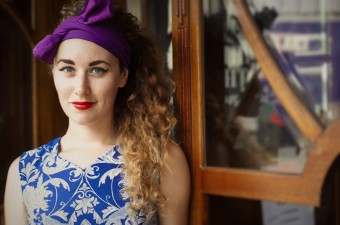Following on from Omar Sakr’s passionate call for “a nation’s artistic output […] to be reflective not just of the values that underpin its social structure but also of the broad and diverse array of voices that populate it”, here, fellow Bali Emerging Writers’ Festival x Emerging Writers’ Festival exchange participant, Lou Heindrich, shares her thoughts on what the festival has to offer diverse writers and audiences.
Lou Heinrich,  a stone cold bibliophile who writes about pop culture and women.
a stone cold bibliophile who writes about pop culture and women.
What do you believe is the role of the arts and EWF in supporting (or otherwise) diverse representations of Australian culture?
It’s imperative for arts organisations to reach out to marginal communities and welcome voices which may not have otherwise have been heard. The arts, writing included, can be yet another field which is affected by the outworking of privilege; different levels of privilege afford different levels of literacy, access to the time needed to write, and platforms to make writers heard. The community surrounding EWF is theoretically quite aware of this privilege, and so it’s important that the organisers actively follow up this ideology, and make sure they actively seek out diverse writers.
Can you give us a brief overview of what you feel that this year’s festival offers Asian Australian or other culturally diverse audiences?
Of course there are the Indonesian writers flown over on the Cultural Exchange Program with the Bali Emerging Writers Festival: Aan Mansyur, a novelist and director of the Makassar International Writers Festival, and Ni Made Purnama Sari, a poet from Jakarta. And if you have a squiz at all of the artists, you can see that there’s quite a few writers from different backgrounds. Personally, I cannot wait to see Amazing Babes 2.0, whose diverse speakers are Carly Findlay, a disability and appearance activist and blogger, and poet and Footscray Arts Centre programmer Alia Gabres.
As a participant, do you feel that the Festival actively seeks representation from culturally and linguistically diverse (CALD) or other historically marginalised groups?
Yes, I think EWF are working hard to do this. The Write-ability Salon is where writers with a disability take over EWF for a night, and this is coupled with a Session for Deaf Writers. Then there’s the black and write! launch event, which honours indigenous writers, and a whole day dedicated to women writers, who have historically been given less weight as male writers, and are continually stereotyped to this day.
Having said this, there are always more groups to incorporate. And I think there is still a sense (from the demographic of most of the attendees) that writing is a white, middle class pursuit. So perhaps we need to include more diverse writers in the regular program, instead of having special events (although EWF are doing this better than any other writers’ festival I know).
As part of your involvement in EWF, do you identify as a member of CALD or other historically marginalised group in the media/literary field, and if so – what kind of feedback would you offer to the festival about the relationship between arts programming and diversity?
I come from a reasonably privileged background, and as a woman writer I have always felt celebrated by EWF! But in terms of advice to the festival, I think they’re doing good work in being inclusive – especially as writers festivals are notoriously upper-class and gentrified. In contrast, EWF seems to have a bit of a grungier, underground, raw feel, while still being being professional. But you know what? They’ve still got to keep going, keep finding ways to make the events accessible to a huge range of people. Keep finding volunteers and staff from diverse backgrounds, keep reaching further out into the suburbs and disadvantaged areas, keep giving young, marginalised voices a platform!
